Apparently there is a correlation between money & happiness.

Previous research has indicated that money stops buying happiness after $75,000/year. However, new research finds a strong correlation between income and happiness, trending upwards even after $80,000/year.
I honestly don't have anything to say, myself, personally, here. I simply want to post this article and research that I came across. I'm going to quote it all word for word. It's just for your information.
I welcome your thoughts...

Let's start with a little entertainment:
The iconic political/dance/period film, 'Cabaret' (1972.)
https://www.imdb.com/title/tt0068327/reference
Can money buy happiness?
"It’s a longstanding question that has many different answers, depending on who you ask.
Today’s chart approaches this fundamental question from a data-driven perspective.
First, a Thinking Exercise
Let’s say you have two hypothetical people: one of them is named Beff Jezos and he’s a billionaire, and the other is named Jill Smith and she has a more average net worth. Who do you think would be happiest if their wealth was instantly doubled?
Beff might be happy that he’s got more in the bank, but materially his life is unlikely to change much – after all, he’s a billionaire. On the flipside, Jill also has more in the bank and is likely able to use those additional resources to provide better opportunities for her family, get out of debt, or improve her work-life balance.
These resources translate to real changes for Jill, potentially increasing her level of satisfaction with life.
Just like these hypotheticals, the data tells a similar story when we look at countries.
The Data-Driven Approach
Today’s chart looks at the relationship between GDP per capita (PPP) and the self-reported levels of happiness of each country. Sources for data are the World Bank and the World Happiness Report 2017.
According to the numbers, the relationship between money and happiness is strong early on for countries. Then later, when material elements of Maslow’s hierarchy are met, the relationship gets harder to predict.
In general, this means that as a country’s wealth increases from $10k to $20k per person, it will likely slide up the happiness scale as well. For a double from $30k to $60k, the relationship still holds – but it tends to have far more variance. This variance is where things get interesting.
Outlier Regions
Some of the most obvious outliers can be found in Latin America and the Middle East:
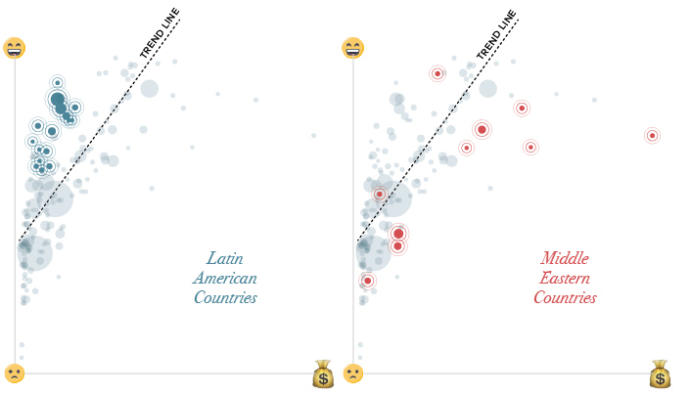
In Latin America, people self-report that they are more satisfied than the trend between money and happiness would predict.
Costa Rica stands out in particular here, with a GDP per capita of $15,400 and a 7.14 rating on the Cantril Ladder (which is a measure of happiness). Whether it’s the country’s rugged coastlines or the local culture that does the trick, Costa Rica has higher happiness ratings than the U.S., Belgium, or Germany – all countries with far higher levels of wealth.
In the Middle East, the situation is mostly reversed. Countries like Saudi Arabia, Qatar, Iran, Iraq, Yemen, Turkey, and the U.A.E. are all on the other side of the trend line.
Outlier Countries
Within regions, there is even plenty of variance.
We just mentioned the Middle East as a place where the wealth-happiness continuum doesn’t seem to hold up as well as it does in other places in the world.
Interestingly, in Qatar, which is actually the wealthiest country in the world on a per capita basis ($127k), things are even more out of whack. Qatar only scores a 6.37 on the Cantril Ladder, making it a big exception even within the context of the already-outlying Middle East.
Nearby Saudi Arabia, U.A.E., and Oman are all poorer than Qatar per capita, yet they are happier places. Oman rates a 6.85 on the satisfaction scale, with less than one-third the wealth per capita of Qatar.
There are other outlier jurisdictions on the list as well: Thailand, Uzbekistan, and Pakistan are all significantly happier than the trend line (or their regional location) would project. Meanwhile, places like Hong Kong, Ireland, Singapore, and Luxembourg are less happy than wealth would predict."
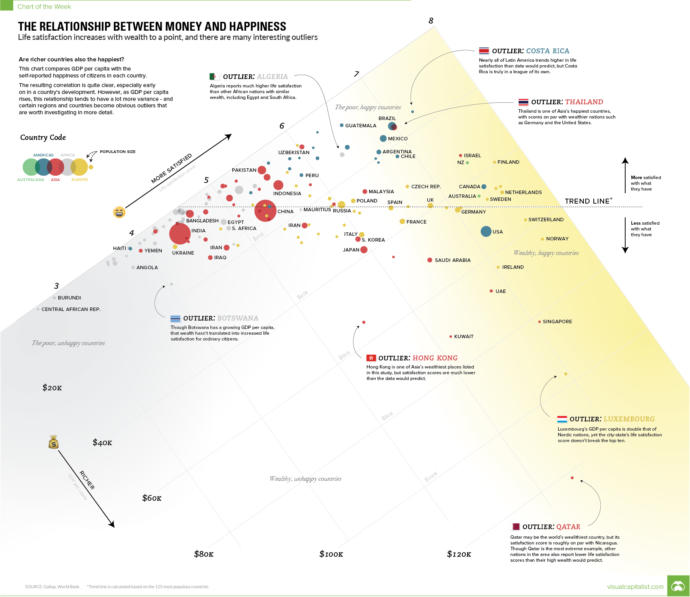
Part II:

In One Chart: Money Can Buy Happiness After All
"What’s the relationship between money and happiness? Previous studies have indicated that, while money can in fact buy happiness, it plateaus at approximately $75,000/year. However, new research suggests otherwise. Using over a million real-time reports from a large U.S. sample group, a recent study found that happiness increases linearly with reported income (logarithmic), and continues to rise beyond the $80,000/year mark.
Below, we’ll provide more details on the research methodology, while touching on a few possible reasons why higher incomes may improve people’s happiness levels.
How is Happiness Measured?
Past research on happiness relative to income has relied on retrospective data, which leaves room for human memory errors. In contrast, this new study uses real-time, logged data from a mood tracking app, allowing for a more accurate representation of respondents’ experienced well-being.
Data was also collected by random prompts over a period of time, with dozens of entries logged for each single respondent. This provides a more well-rounded representation of a person’s overall well-being.
Two forms of well-being were measured in this study:
Experienced well-being:
A person’s mood and feeling throughout daily life.
Evaluative well-being:
Someone’s perception of their life upon reflection.
Both forms of well-being increased with higher incomes, but evaluative well-being showed a more drastic split between the lower and higher income groups.
The Results (Measured in Standard Deviations from Mean)
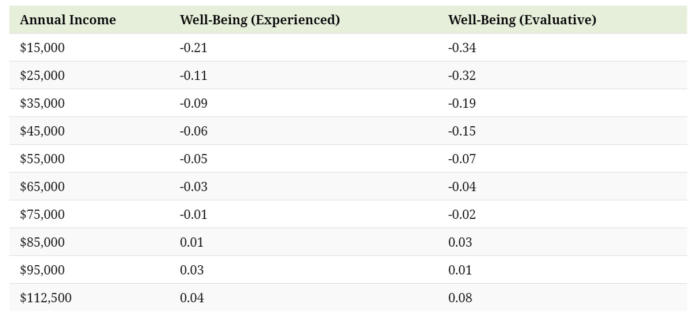
Why Does Money Buy Happiness?
The report warns that any theories behind why happiness increases with income are purely speculative. However, it does list a few possibilities:
Increased comfort
As someone earns more, they may have the ability to purchase things that reduce suffering. This is particularly true when comparing low to moderate income groups—larger incomes below $80,000/year still showed a strong association with reduced negative feelings.
More control
Control seems to be tied to respondents’ happiness levels. In fact, having a sense of control accounted for 74% of the association between income and well-being.
Money matters
Not all respondents cared about money. But for those who did, it had a significant impact on their perceived well-being. In general, lower income earners were happier if they didn’t value money, while higher income earners were happier if they thought money mattered.
Whatever the cause may be, one thing is clear—Biggie Smalls was wrong. Looks like more money doesn’t necessarily mean more problems."
https://www.visualcapitalist.com/chart-money-can-buy-happiness-after-all/
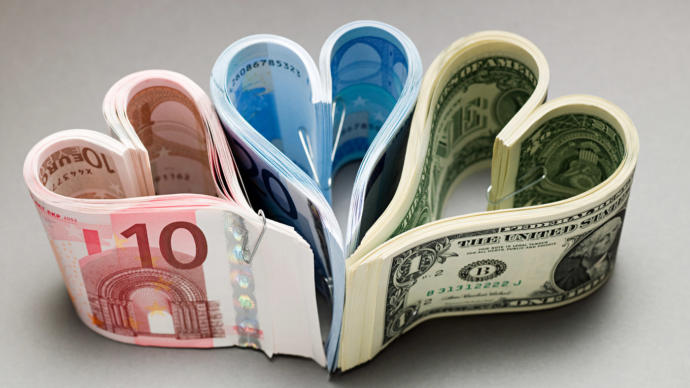
P.S. @Unit1 How do you like them apples?! (Shhhh. You get 15 min to gloat. And you're welcome. 💶)
But do be careful, all. Spend it wisely!
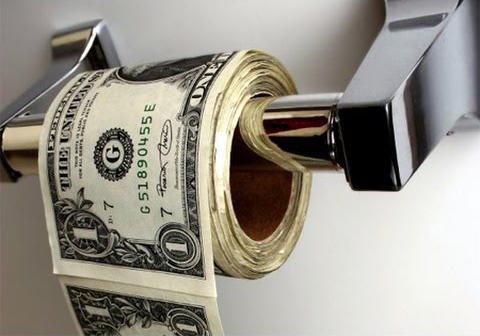
 Holidays
Holidays  Girl's Behavior
Girl's Behavior  Guy's Behavior
Guy's Behavior  Flirting
Flirting  Dating
Dating  Relationships
Relationships  Fashion & Beauty
Fashion & Beauty  Health & Fitness
Health & Fitness  Marriage & Weddings
Marriage & Weddings  Shopping & Gifts
Shopping & Gifts  Technology & Internet
Technology & Internet  Break Up & Divorce
Break Up & Divorce  Education & Career
Education & Career  Entertainment & Arts
Entertainment & Arts  Family & Friends
Family & Friends  Food & Beverage
Food & Beverage  Hobbies & Leisure
Hobbies & Leisure  Other
Other  Religion & Spirituality
Religion & Spirituality  Society & Politics
Society & Politics  Sports
Sports  Travel
Travel  Trending & News
Trending & News 





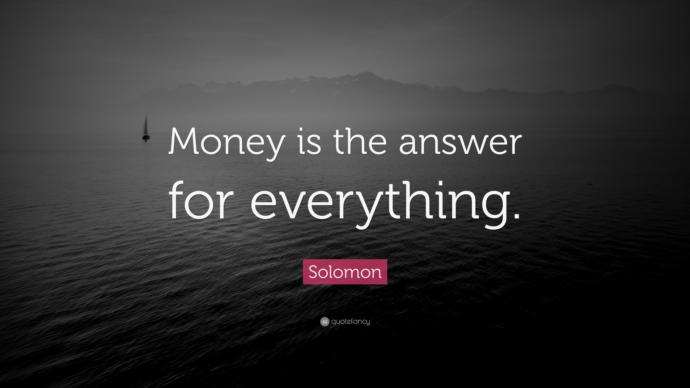
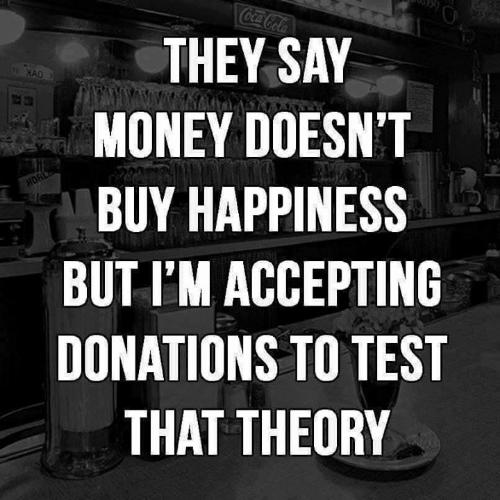
Most Helpful Opinions